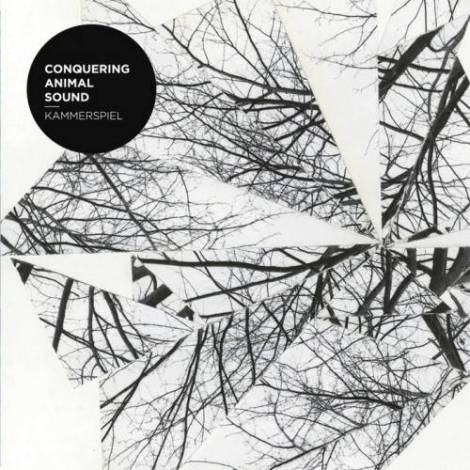 Conquering Animal Sound – Kammerspiel
Conquering Animal Sound – Kammerspiel
[Gizeh, 2011]
Jeff Pearson, February 25, 2011
Originally published by Life’s Sweet Breath
Buy: Direct
Listen: “Bear”
Conquering Animal Sound’s Kammerspiel gently introduces itself like a music box opening wide to expose a singular dancing figurine, languidly spinning to soft toy piano chimes. There is something entirely soft and fragile about the sounds on display here. The record quickly journeys into the inner workings of the music box, exposing the electrical current passing through the dancer’s outstretched arm, the deep pulses of rhythmic pattern, sounds of perfect clockwork. This is all before Anneke Kampman has even sung a note.
The Scottish duo’s sound is characterized by delicately placed instrumentation and atmospheric soundscapes created by both James Scott and Kampman, with the latter sweetly singing atop the songs like clouds floating over an artificially lit, hillside town. The combination of electronic looping with organic instrumentation makes for an interesting juxtaposition, the band constantly straddles the border between reality and some wholly visionary realm. The album itself leans towards darker sonic territory, especially on tracks like “Wildthings” and “Bear”, where the melancholy backdrop plays foil to Kampman’s beautifully sung vocals. The interesting thing about songs such as those is no matter how dark, thematically and sonically, the songs sound, Kampman’s vocals serve as a source of light, which could seemingly brighten the deepest cavern.
The album opener, “Maschine” sets this prevalent tone for the rest of the record; the contrast of the hushed, grounded vocals against the somewhat otherworldly textures is in full force. The beat builds and slowly throbs through the second half of “Maschine”, as the vocals are looped and tinkered with, culminating in a veritable wall of sound. The song ventures deeper into the mechanics of the music box’s dancer, until finally settling back into the bright, tinkling chimes of the perceivable portion of the music box. “Wasp” starts off with a slow cadence, gradually picking up layers along the way, including some jittery percussion and washes of orchestral synthesizers. The song takes the form of the brief lifespan of the average wasp, starting with the measured rhythms of the first wing beats, picking up more and more activity, until being stripped away of all but those basic rhythms. The duo has an uncanny ability to lull you into a comfortable state of trance, and before you know it, your senses are attacked with an all-out onslaught of textures.
The aforementioned “Bear”, brings the somewhat unsettling nature of Kampman’s lyrics to the forefront, as she sings, “I am a meal for you/I am a meal for two”. Kampman has gone on record stating that “Bear” was written after seeing the Werner Herzog documentary, Grizzly Man, which chronicles Timothy Treadwell as he attempts to infiltrate and coexist with a community of grizzly bears. The combination of the lyrical content and minimalist instrumental approach speaks volumes to the pain behind Treadwell’s story, in a way that a lush arrangement never could. The space created by Scott and Kampman within the song is filled with whatever emotion invoked within the listener.
The remainder of Kammerspiel continues to build on the atmospheric themes created in the first half, while constantly stretching out into new territories. Songs like “Tracer” and “Giant” have massive-sounding peaks of stimulating sounds meant to lightly dance through the listener’s neural pathways, leaving behind only the slightest trace of ever having been there. The record accomplishes the rare feat of invoking happiness and a feeling of being at home, while crafting this “home” as such a foreign landscape to most listeners. The atmospheres created are dense, while somehow sounding sparse and conservative. It may take the listener multiple journeys through Kammerspiel to fully feel its force, but once settled in, the ride through the music box is well worth it.
